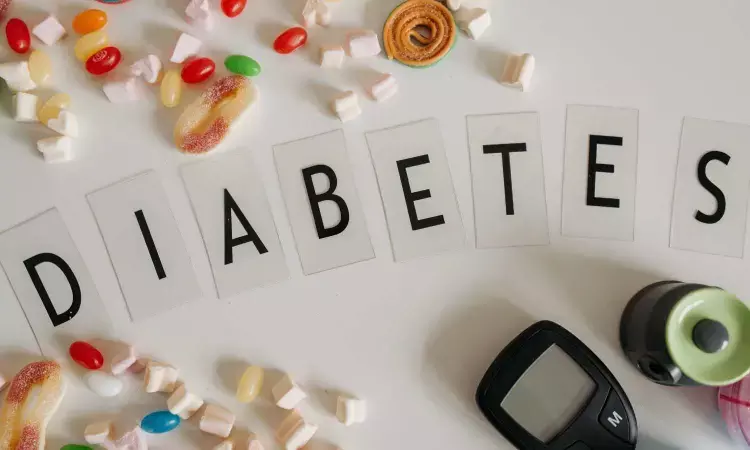- Home
- Medical news & Guidelines
- Anesthesiology
- Cardiology and CTVS
- Critical Care
- Dentistry
- Dermatology
- Diabetes and Endocrinology
- ENT
- Gastroenterology
- Medicine
- Nephrology
- Neurology
- Obstretics-Gynaecology
- Oncology
- Ophthalmology
- Orthopaedics
- Pediatrics-Neonatology
- Psychiatry
- Pulmonology
- Radiology
- Surgery
- Urology
- Laboratory Medicine
- Diet
- Nursing
- Paramedical
- Physiotherapy
- Health news
- Fact Check
- Bone Health Fact Check
- Brain Health Fact Check
- Cancer Related Fact Check
- Child Care Fact Check
- Dental and oral health fact check
- Diabetes and metabolic health fact check
- Diet and Nutrition Fact Check
- Eye and ENT Care Fact Check
- Fitness fact check
- Gut health fact check
- Heart health fact check
- Kidney health fact check
- Medical education fact check
- Men's health fact check
- Respiratory fact check
- Skin and hair care fact check
- Vaccine and Immunization fact check
- Women's health fact check
- AYUSH
- State News
- Andaman and Nicobar Islands
- Andhra Pradesh
- Arunachal Pradesh
- Assam
- Bihar
- Chandigarh
- Chattisgarh
- Dadra and Nagar Haveli
- Daman and Diu
- Delhi
- Goa
- Gujarat
- Haryana
- Himachal Pradesh
- Jammu & Kashmir
- Jharkhand
- Karnataka
- Kerala
- Ladakh
- Lakshadweep
- Madhya Pradesh
- Maharashtra
- Manipur
- Meghalaya
- Mizoram
- Nagaland
- Odisha
- Puducherry
- Punjab
- Rajasthan
- Sikkim
- Tamil Nadu
- Telangana
- Tripura
- Uttar Pradesh
- Uttrakhand
- West Bengal
- Medical Education
- Industry
Closed-Loop Control system insulin administration effective for blood sugar control among kids with type 1 diabetes

A new study by Mosleh Jabari showed that in adolescents with type 1 diabetes, Closed-Loop Control (CLC) insulin administration had considerably higher day and night effectiveness and safety than Sensor-Augmented Insulin Pump (SAP) treatment. The findings of this study were published in Nature Scientific Reports.
Children suffering with diabetes mellitus (DM), which is a collection of metabolic illnesses rather than a single condition characterized by persistent hyperglycemia, have been a global concern. Glycemic objectives for children with T1DM have gotten increasingly stringent over time, and the average blood glucose (sugar) level goal for all children, regardless of age, is currently 70 to 120 mg/dL. Recent technological breakthroughs, such as insulin pumps and ongoing glucose monitoring devices, have transformed T1DM management.
A traditional therapy is the Sensor-Augmented Insulin Pump, which mimics pancreatic insulin production by continuous subcutaneous insulin infusion (CSII). The CLC insulin delivery systems are distinguished by real-time glucose-responsive administration of insulin and the combination of glucose-sensing and insulin-delivery components.
The goal of this meta-analysis is to evaluate the efficacy and safety of CLC to SAP in adolescents with type 1 diabetes (T1DM) by comparing glycemic results and hypoglycemia episodes.
Eleven randomized-controlled trials with a total of 570 patients were chosen from a total of 869 papers determined to follow PRISMA standards. The effectiveness of the therapy was determined by monitoring the mean Time In Range (TIR), blood glucose (BG), and Standard Deviation (SD) of the glucose fluctuation during the day, night, and during physical activities. The safety of the treatments was determined by monitoring hypoglycemia and hyperglycemic episodes during the day and night.
The key findings of this study were:
4.33, 16.61, and 8.27 are the pooled findings of a comparison of mean BG levels for day, night, and physical activities.
Monitoring for TIR 13.18, 15.36, and 7.39 during the day, night, and physical activity. SD of glucose variability was 0.40 and 0.86 throughout the day and night, respectively.
These figures demonstrate the advantages of the CLC system in terms of effectiveness.
The day, night, and physical activity observations of average blood glucose target hypoglycemia events 0.54, 0.04 and 0.00 and hyperglycemic events 0.04, 7.11 and 0.00 underscore CLC's remarkable safety factor.
Reference:
Jabari, M. (2023). Efficacy and safety of closed-loop control system for type one diabetes in adolescents a meta analysis. In Scientific Reports (Vol. 13, Issue 1). Springer Science and Business Media LLC. https://doi.org/10.1038/s41598-023-40423-y
Neuroscience Masters graduate
Jacinthlyn Sylvia, a Neuroscience Master's graduate from Chennai has worked extensively in deciphering the neurobiology of cognition and motor control in aging. She also has spread-out exposure to Neurosurgery from her Bachelor’s. She is currently involved in active Neuro-Oncology research. She is an upcoming neuroscientist with a fiery passion for writing. Her news cover at Medical Dialogues feature recent discoveries and updates from the healthcare and biomedical research fields. She can be reached at editorial@medicaldialogues.in
Dr Kamal Kant Kohli-MBBS, DTCD- a chest specialist with more than 30 years of practice and a flair for writing clinical articles, Dr Kamal Kant Kohli joined Medical Dialogues as a Chief Editor of Medical News. Besides writing articles, as an editor, he proofreads and verifies all the medical content published on Medical Dialogues including those coming from journals, studies,medical conferences,guidelines etc. Email: drkohli@medicaldialogues.in. Contact no. 011-43720751


